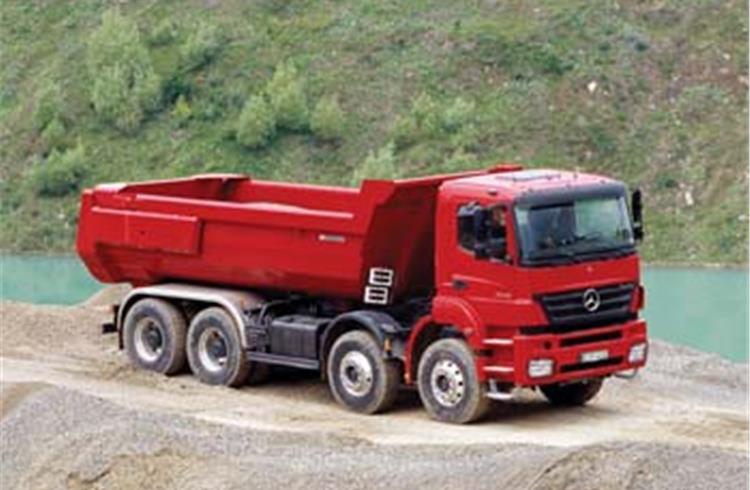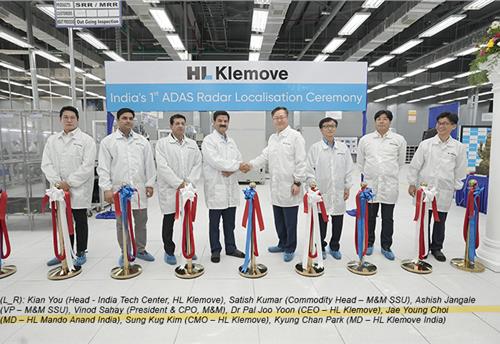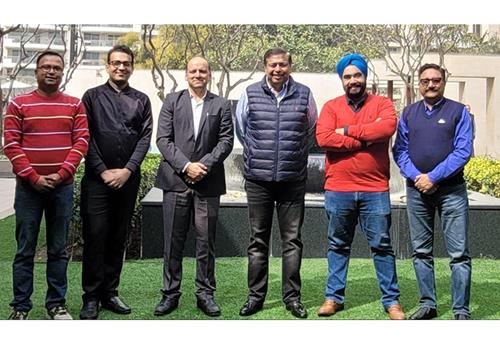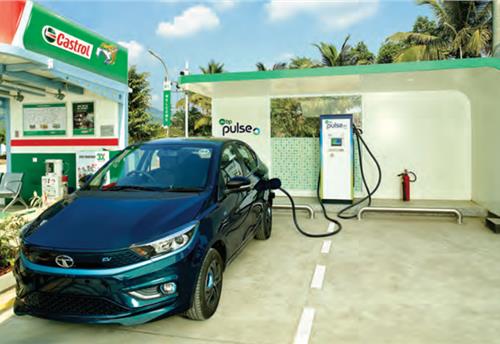Daimler bets big on Indian market
Following Hero’s abrupt withdrawal from their joint venture, Daimler Trucks has announced that it is pressing on with its Indian truck project in Chennai with even greater determination.
Indeed, for Andreas Renschler, the Daimler board member responsible for Daimler Trucks, India is more than just a market for the company’s commercial vehicles; he enthuses that it is the “key to a completely new generation of products”.
This reflects the priority Daimler accords to this market — above its highly efficient manufacturing facilities in Brazil and Turkey, and even its new joint venture in China. Indeed, according to company sources, the India project is being considered Daimler Trucks’ fourth global pillar after its German, Japanese, and North American operations.
Putting its money where its mouth is, so to speak, Daimler has affirmed that it will, by itself, invest the entire 700 million euros that its partner was to have contributed 40 percent of over the next four years. Although Renschler asserts that nothing has changed in the plan to manufacture trucks in Chennai, the company’s priorities appear to have shifted somewhat since, as the truck chief adds, Daimler “will not position trucks in an economic downturn”.
Change of plan
The original plan envisaged 9- and 12-tonne light duty trucks (LDTs) based on the Mitsubishi Fuso Canter being introduced first in the second half of 2010. According to one account the company has put the LDTs on the backburner, and instead advanced the development of the 25-tonne (6×2) medium duty truck (MDT) and a 4×2 semitrailer tractor for 40 tonnes GCW, with a launch target of September 2011.
According to the present plan, heavy-duty trucks will together account for 36,000 of the eventual capacity of 70,000 units at the Oragadam plant by 2018. The 40-tonne tractor will then make up the biggest chunk, 60 percent or 21,600 units. (This is a segment where Daimler’s closest competitor Volvo too sees the biggest prospects going forward: VE Commercial Vehicles plans to produce 35,000 rigid and tractor variants of its 4×2 Asia Global Truck.) Two other heavy duty models – a 32-tonne 8×2*4 rigid and a semitrailer tractor for 49 tonne GCWs – are scheduled to follow in 2012. These will account for 30 percent (10,800) and 10 percent (3,600) of production respectively.
The fact that Daimler has had to pay an additional 16 million euros for Hero’s 40 percent holding in the erstwhile joint venture throws up the possibility that it might reconsider committing the entire planned investment to Chennai for building the full range of trucks (LDT, MDT, and HDT). This is because Daimler’s other 100 percent subsidiary, Mercedes-Benz India, already has a facility in Pune to assemble heavy Actros trucks and bus chassis.
An option would be to expand the capacity at the Actros plant and use that to assemble the 49-tonners, at least to begin with. The fact that these will not account for more than 4,000 units a year, and Mercedes-Benz India has a present capacity of 4,000 (in three shifts) with scope for expansion, certainly lends substance to this suggestion. But Uta Leitner of Daimler Trucks’ global business communications office denies this. “This is not an option. Mercedes-Benz India sells Mercedes-Benz trucks for special applications such as the Actros for construction use. This will continue. The new plant we are building in Chennai is where we will produce trucks for the Indian volume market,” she wrote in reply to an e-mail enquiry.
The medium and heavy trucks have been based on Turkish configurations of the Mercedes Axor heavy truck platform. This is Daimler’s volume brand for trucks of 18 tonnes GVW and above in the markets of South America and Eastern Europe, and is primarily built in Brazil and Turkey. The Axor is available with three different six-cylinder inline engines: the 6374cc OM 906 LA, the 7201cc OM 926 LA, and the 11,967cc OM 457 LA, all built in Brazil. The Turkish range is powered by the OM 906 in Euro 2 and Euro 4 versions, besides the OM 457 in Euro-3. The Brazilian Axor, by contrast, uses Euro-3 versions of the OM 926 and OM 457. The bulk of the range produced in India will have the OM 906. This engine is presently available in Euro-2 ratings of 231hp @ 2300rpm / 810 Nm @ 1200–1500rpm and 279hp/1100 Nm in Turkey, and a single Euro-3 rating of 245hp @ 2200rpm / 900 Nm @ 1200–1600rpm in Brazil. Assuming a 2011 launch, the engine will have to be offered in BS3 and BS4 versions in India.
A distinct possibility for the 49-tonne tractor variant in India because of the higher power requirement is the OM 926. In Brazil this Euro-3 engine is rated at 326hp @ 2200rpm /1250 Nm @ 1400–1600rpm in the 2533 6×2 distribution truck and the 1933 4×2 tractor (the closest equivalent to a 40-tonner in India), whereas the heavy off-road 2831 6×4 uses the same version with 305hp @ 2200 rpm / 1200 Nm @ 1400–1600rpm as in the 1830 coach that Mercedes-Benz sells in India. (By comparison the lowest-powered Turkish tractor, the 1835 4×2, uses the OM 457. This engine also powers the 2540 6×2 and 2644 6×4 heavy-duty tractors in the Brazilian market.) The gearbox likely to be chosen is the nine-speed G131-9 fitted in the 25- and 32-tonne trucks in Turkey, and possibly the G221-9 as in the severe-service 2831 in Brazil. By contrast the 1933 and 2533 on-road trucks in Brazil use the 16-speed G211-16.
Improved cost-efficiency
The vehicles will have 80 percent local content from the beginning, according to company sources. Whether this will include engines and transmissions right from the start is not clear, although Mercedes-Benz India managing director Wilfried Aulbur confirmed to reporters recently that the engines and gearboxes will be sourced domestically. As part of such a strategy, standardising on one engine model would yield higher cost efficiency in sourcing because of the scale effect.
Magna Steyr in Pune has been commissioned for the extensive exercise of identifying and qualifying local vendors. Working together with Engineering Centre Steyr (ECS), Magna International’s global headquarters for truck engineering, the engineering firm’s Pune office is also responsible for the product definition for the complete vehicle.
This involves studying Indian customer needs and adapting the vehicle platform for the road and traffic conditions, regulations, etc. The detailed product definition is understood to have been submitted to Daimler earlier this year, and the company will be continuously engaged in the various phases of the development lifecycle right till the start of production.
“Daimler had already done a thorough study of the market even before they went to Magna Steyr. Their technical people had an excellent understanding of the market, better than the Indian OEMs themselves, and a much higher maturity. Even at that time their approach was very systematic; they were not just chasing the boom,” a person with knowledge of the programme told Autocar Professional. One prospective supplier said Daimler has adopted MAN’s CLA range produced by the latter’s MAN Force Trucks JV in India as its benchmark in its component and aggregate vendor development exercise. Autocar Professional’s enquiries revealed that it is in talks with Eaton for transmissions; Meritor for axles; TACO Hendrickson for suspensions; Knorr-Bremse and WABCO-TVS for brake systems; Concentric (Haldex Hydraulics) for oil, water, and fuel lift pumps; Cosma International for complete cabs-in-white; Jaya Hind for engine and gearbox castings and clutches; and Norma Group Products for clamps. Mexican major Metalsa which recently set up a facility in Jamshedpur, has been named as a probable supplier for axle frames, Kalyani Lemmerz for wheels, Behr India for engine and cabin cooling products, and Continental India for instrument clusters, multiplex cabling, and body control modules.
Stadco’s Chennai office is believed to be working on designs for new cabin variants. This British body-in-white specialist developed and helped productionise the cab that Mercedes-Benz’s Accelo light truck range in Brazil shares with its Unimog U20 built in Germany. Bharat Forge is the presumptive supplier of forged powertrain and chassis components. Engine timing and transmission gears will in all likelihood come from Turbo Gears.
A conflict of exports?
At the end of January 2009, Daimler announced that it would invest of $929 million (a little over 700 million euros), pending Chinese government approval, in a 50:50 joint venture with Beiqi Foton Motor Co that, according to agency reports, will start building medium- and heavy-duty trucks in 2012 for China and other world markets, such as Russia, Brazil, and Indonesia. These are expected to be Mercedes-powered variants of Foton’s Auman-branded models.
Since Daimler in India also plans to export trucks in the future to developing markets, presumably the same ones that Beijing Foton Daimler too will be active in, won’t there be a clash of interests? Avoiding a direct reply, Ms Leitner said the two ventures have been positioned differently and suggested that future exports from either venture will be balanced in tune with strategic initiatives Daimler Trucks takes as part of its Global Excellence programme (see box above) to maintain and extend its global market leadership. “We are well aware of the task to clearly position the future trucks from India and China for their specific customers and markets. For the Indian venture, the priority is to produce vehicles for the volume market in this country. In China the objective is to benefit from Foton’s broad distribution network," she added.
RELATED ARTICLES
Branded content: HL Klemove inaugurates first Local ADAS Radar Manufacturing Unit in India, marks a significant achievement in “Make in India” initiative
The inauguration ceremony was held in the presence of Vinod Sahay, President and CPO of Mahindra & Mahindra Ltd. and Dr....
BluWheelz to 'Green Up' logistics sector
With their EVs-as-a-service solution, the startup is playing it smart with costs and looking to electrify the entire seg...
BRANDED CONTENT: Spearheading the EV revolution in India
Jio-bp is a joint venture between Reliance Industries and BP PLC where both entities have married international expertis...





 By Autocar Pro News Desk
By Autocar Pro News Desk
 06 May 2009
06 May 2009
 5573 Views
5573 Views









